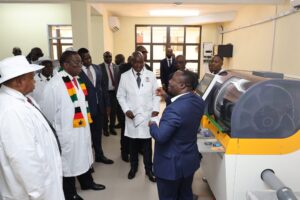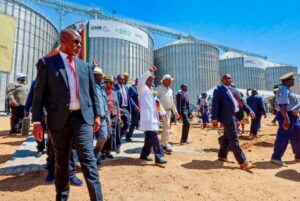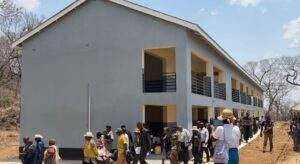From Pole-and-Dagga to Double-Storey Modernity…
5 min read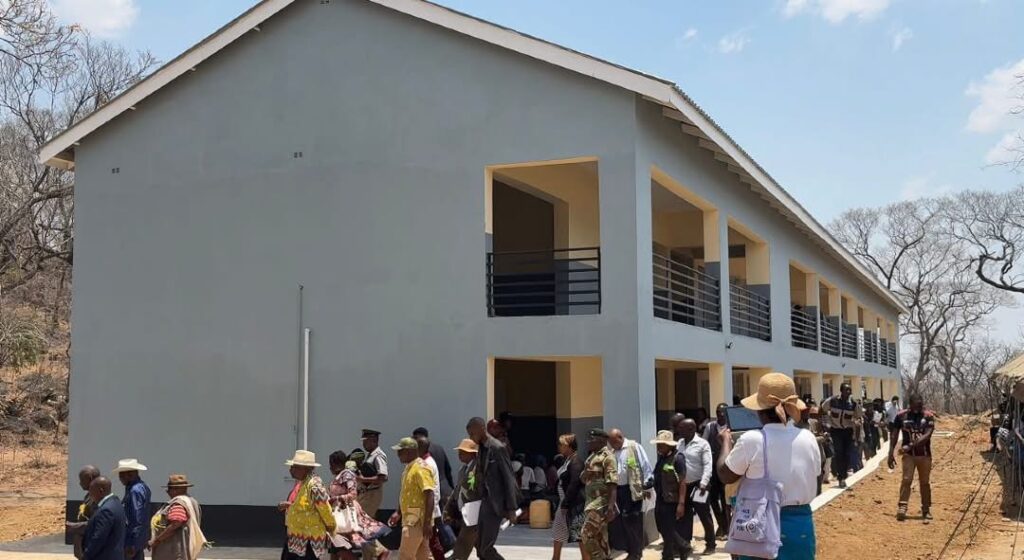
…Gangarabwe Primary School Transformed Through PPP
Hurungwe — A new chapter has opened in the story of rural education as Gangarabwe Primary School in Hurungwe District celebrates a stunning transformation — from crumbling pole-and-dagga huts to gleaming, double-storey classroom blocks.
This remarkable turnaround has been made possible through a visionary Public-Private Partnership (PPP) between the Government of Zimbabwe and the Minerals Marketing Corporation of Zimbabwe (MMCZ).
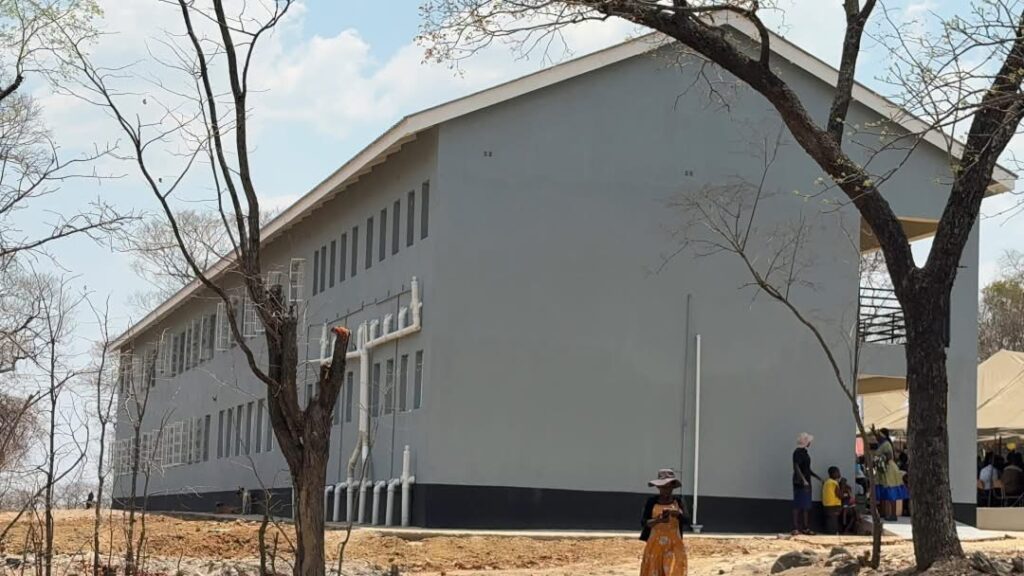
Where once learners braved harsh weather in dilapidated structures with no windows or furniture, today they attend lessons in a modern facility equipped with proper classrooms, learning materials, and sanitation facilities.
The sight of the new buildings, painted in bright colours and towering above the surrounding fields, stands as a powerful symbol of progress, resilience, and partnership in the quest for quality education for all.
Gangarabwe Primary School, located in a remote corner of Hurungwe District, was once a reflection of the stark inequalities in educational infrastructure between urban and rural areas.
The school’s structures — simple mud huts with thatched roofs and cracked floors — were emblematic of the struggles faced by thousands of children across Zimbabwe’s countryside.
Parents and teachers often spoke of the challenges: overcrowded classrooms, leaking roofs during the rainy season, and limited learning resources.
Many pupils were forced to share desks, while others sat on the floor or studied under trees. Despite these odds, the school consistently produced determined learners, guided by committed teachers who persevered against all odds.
Today, the situation could not be more different. Through the PPP model, Gangarabwe Primary now boasts two magnificent double-storey classroom blocks, an administration office, modern ablution facilities, and a solar-powered water system.
The new infrastructure has not only elevated the standard of learning but also restored dignity and hope to a once-neglected community.
The partnership with the Minerals Marketing Corporation of Zimbabwe marks a milestone in the practical implementation of Zimbabwe’s PPP policy, which encourages collaboration between government entities and the private sector to drive social and infrastructural development.
Speaking at the commissioning of the new facilities, MMCZ General Manager Mr. Tendai Pasi described the project as part of the corporation’s corporate social responsibility programme aimed at empowering communities in areas where the mineral trade contributes to the national economy.
“As MMCZ, we believe that minerals are not just for export or profit — they must also transform the lives of our people. By investing in education, we are investing in the future scientists, engineers, and leaders who will continue to build this country,” said Mr. Pasi.
He noted that the decision to partner with Gangarabwe Primary School was driven by the need to ensure that rural learners enjoy the same quality of education and infrastructure as their urban counterparts.
The success of this partnership, he added, should serve as a model for other corporations to emulate.
The transformation at Gangarabwe Primary aligns perfectly with the Government of Zimbabwe’s vision for an inclusive, equitable education system as enshrined in Vision 2030 — which seeks to make Zimbabwe an upper-middle-income economy by the end of the decade.
Officiating at the handover ceremony, Mashonaland West Provincial Affairs and Devolution Minister, Hon. Marian Chombo, commended MMCZ and the local community for their collaborative spirit.
“This development is a shining example of what can be achieved when government, the private sector, and communities work together,” she said. “Education is the foundation of national development, and what we are witnessing here today is not just the construction of classrooms, but the construction of dreams.”
Minister Chombo further highlighted that the Second Republic, under the leadership of His Excellency President Dr. Emmerson Dambudzo Mnangagwa, has placed education and rural development at the core of its modernisation agenda. She reaffirmed government’s commitment to ensuring that no child is left behind, regardless of where they live.
For the Gangarabwe community, the new school infrastructure represents more than just buildings — it is a testament to their perseverance and unity.
Headmaster Mr. Augustine Mudzamiri could hardly hide his joy. “For years, we struggled to deliver lessons under very difficult conditions.
The transformation we see today is beyond our wildest dreams. It has given our teachers motivation and our learners a sense of pride,” he said.
Parents and guardians echoed the same sentiment. One parent, Mrs. Rudo Mutsvangwa, said the new facilities have renewed hope among parents who previously feared their children would not receive a quality education.
“Our children can now learn in a clean and safe environment. We thank the government and MMCZ for bringing light to our community,” she said.
Learners, too, expressed excitement. Twelve-year-old Grade Six pupil, Tariro Mupasiri, said she was inspired to study harder now that she has proper classrooms and learning materials. “I want to become an engineer so that I can build more schools like this one,” she said with a smile.
The success story of Gangarabwe Primary School underscores the effectiveness of PPPs as a vehicle for sustainable development.
Across the country, similar collaborations are being encouraged in sectors such as health, transport, and energy — but education remains one of the most critical.
By leveraging the resources, expertise, and innovation of the private sector, while maintaining government oversight and policy direction, PPPs can bridge infrastructure gaps that would otherwise take decades to close.
Analysts have hailed the Gangarabwe initiative as a case study in inclusive development. It demonstrates how corporate entities like MMCZ can contribute tangibly to the nation’s progress beyond their core business operations.
The success of this initiative has already attracted attention from other districts in Mashonaland West and beyond.
Plans are reportedly underway to replicate similar projects in other rural schools in Hurungwe and Kariba districts.
Education officials say such investments will not only improve learning outcomes but also help attract qualified teachers who might otherwise avoid rural postings due to poor infrastructure.
“The modernisation of Gangarabwe Primary is a step toward equity,” said District Schools Inspector, Mrs. Chitombo. “It sends a clear message that rural children deserve the same quality of facilities and opportunities as those in urban centres.”
Gangarabwe Primary School’s metamorphosis from humble pole-and-dagga huts to state-of-the-art double-storey classroom blocks is more than a story of infrastructure development — it is a story of vision, collaboration, and faith in the power of education to transform lives.
Through the Public-Private Partnership between MMCZ and the Government of Zimbabwe, a once-forgotten school has been reborn, shining as a beacon of hope for rural education.
It stands as living proof that when communities, government, and private entities unite under a shared purpose, real change is not only possible — it is inevitable.
As the sun sets over the new buildings of Gangarabwe Primary School, the laughter of children echoes across the fields — a joyous sound of a community stepping boldly into a brighter future.


